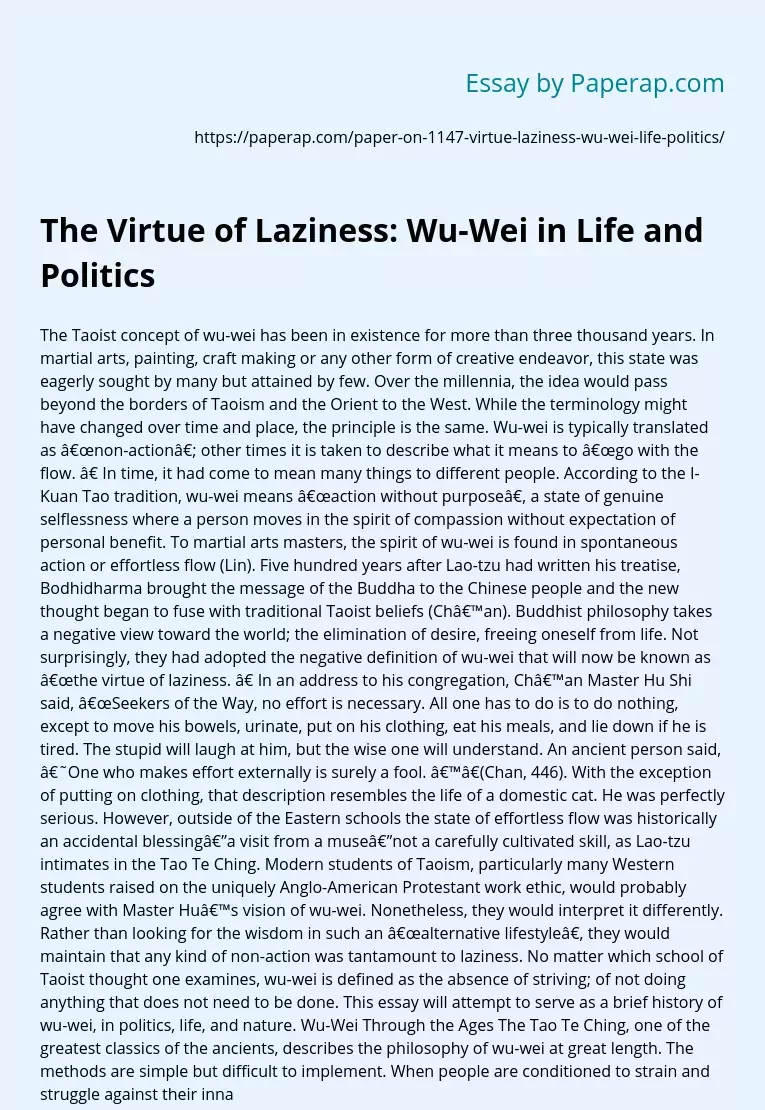The Virtue of Laziness: Wu-Wei in Life and Politics
The Taoist concept of wu-wei has been in existence for more than three thousand years. In martial arts, painting, craft making or any other form of creative endeavor, this state was eagerly sought by many but attained by few. Over the millennia, the idea would pass beyond the borders of Taoism and the Orient to the West. While the terminology might have changed over time and place, the principle is the same. Wu-wei is typically translated as “non-action”; other times it is taken to describe what it means to “go with the flow.
” In time, it had come to mean many things to different people. According to the I-Kuan Tao tradition, wu-wei means “action without purpose”, a state of genuine selflessness where a person moves in the spirit of compassion without expectation of personal benefit. To martial arts masters, the spirit of wu-wei is found in spontaneous action or effortless flow (Lin). Five hundred years after Lao-tzu had written his treatise, Bodhidharma brought the message of the Buddha to the Chinese people and the new thought began to fuse with traditional Taoist beliefs (Ch’an).
Buddhist philosophy takes a negative view toward the world; the elimination of desire, freeing oneself from life. Not surprisingly, they had adopted the negative definition of wu-wei that will now be known as “the virtue of laziness. ” In an address to his congregation, Ch’an Master Hu Shi said, “Seekers of the Way, no effort is necessary. All one has to do is to do nothing, except to move his bowels, urinate, put on his clothing, eat his meals, and lie down if he is tired.
The stupid will laugh at him, but the wise one will understand. An ancient person said, ‘One who makes effort externally is surely a fool. ’”(Chan, 446). With the exception of putting on clothing, that description resembles the life of a domestic cat. He was perfectly serious. However, outside of the Eastern schools the state of effortless flow was historically an accidental blessing—a visit from a muse—not a carefully cultivated skill, as Lao-tzu intimates in the Tao Te Ching.
Modern students of Taoism, particularly many Western students raised on the uniquely Anglo-American Protestant work ethic, would probably agree with Master Hu’s vision of wu-wei. Nonetheless, they would interpret it differently. Rather than looking for the wisdom in such an “alternative lifestyle”, they would maintain that any kind of non-action was tantamount to laziness. No matter which school of Taoist thought one examines, wu-wei is defined as the absence of striving; of not doing anything that does not need to be done.
This essay will attempt to serve as a brief history of wu-wei, in politics, life, and nature. Wu-Wei Through the Ages The Tao Te Ching, one of the greatest classics of the ancients, describes the philosophy of wu-wei at great length. The methods are simple but difficult to implement. When people are conditioned to strain and struggle against their innate nature, reaching a state of harmonic, skillful being is extremely difficult. Lao-tzu wanted to teach people to return to the way they were naturally; working cooperatively with one another and the world at large.
Emphasizing gentleness, persistence, non-interference, peacefulness, and courage, Lao-tzu teaches the importance of achieving harmony with the way things are rather than fighting against the current, forcing people and nature into an incongruent state. Alluding to the hands off approach of the ideal ruler, the relative weakness of water, and other naturalistic examples of non-interference, he overturns the prevailing norms that make enduring great struggle the height of virtue, “The gentlest thing in the world overcomes the hardest thing in the world.
That which has no substance enters where there is no space. This shows the value of non-action. Teaching without words, performing without actions: that is the Master’s Way”(Lao-tzu, 43). Like his mentor, Zhuangzi (more famously Chang-tzu) also emphasizes the importance of wu-wei in his work. While Lao-tzu uses somewhat abstract poetic descriptions of water, light, and shadow, Zhuangzi prefers to share anecdotes of normal people in normal careers that display the highest degree of excellence in whichever endeavor they decide to undertake.
Such Average Joes included craftsmen, athletes, woodcarvers, and even butchers. One of the most striking examples of wu-wei is Ding the Butcher. He possessed one knife for nineteen years because he perfected his craft in such a slow and deliberate manner, practicing no mistakes in the learning period. Eventually, the practice segued into mastery and watching him at work was a spectacle of effortless grace, bloody as his profession was. The butcher quite eloquently describes his career of non-action, “Perception and understanding have come to a stop and spirit moves where it wants.
I go along with the natural makeup, strike in the big hollows, guide the knife through the big openings, and follow things as they are. So I never touch the smallest ligament or tendon, much less a main joint. There are spaces between the joints, and the blade of the knife has really no thickness…. [I] move the knife with the greatest subtlety, until—flop! The whole thing comes apart like a clod of earth crumbling to the ground”(Littlejohn).
The Virtue of Laziness: Wu-Wei in Life and Politics. (2017, May 23). Retrieved from https://paperap.com/paper-on-1147-virtue-laziness-wu-wei-life-politics/

